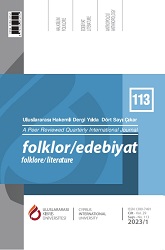Two Sides of Egalitarianism: William Wordsworth and Percy Bysshe Shelley
Two Sides of Egalitarianism: William Wordsworth and Percy Bysshe Shelley
Author(s): Seçil VaralSubject(s): Poetry, Political Philosophy, Social Philosophy, 18th Century, 19th Century, British Literature
Published by: Uluslararası Kıbrıs Üniversitesi
Keywords: luck egalitarianism; William Wordsworth; political egalitarianism; Percy Bysshe Shelley;
Summary/Abstract: Egalitarianism is a social and political philosophy propounding that all mankind should have equal rights and treatment on the premise that everyone is born equal. Although the philosophy dates back to Stoicism in Ancient Greece, it reached its apogee with the American Declaration of Independence (1776) and the French Revolution (1789). Impelled by the egalitarian concepts of equality, fraternity, and liberty as well as the revolutionary ideas of English intellectuals such as William Godwin and Mary Wollstonecraft, English romantic poets expressed a deep concern for injustice and inequality in English society. Although their starting point is the same, the romantic poets’ notion of egalitarianism diverges from each other due to socio-political conditions of their era. This paper outlines two sides of egalitarianism in specific works from two different generations romantic poets, Wordsworth and Shelley, to show that Wordsworth’s egalitarian concern is based on luck egalitarianism that attributes inequality to an individual’s either natural endowments or responsibility; whereas, Shelley adopts political egalitarianism regarding “equality of rights” as a prerequisite to building an egalitarian system. Thus, the paper aims to reveal that Wordsworth primarily detects the problem of inequality by attributing it to ‘luck’, whereas, Shelley due to the heat of current politics offers political solutions to this problem twenty years later.
Journal: Folklor/Edebiyat
- Issue Year: 29/2023
- Issue No: 113
- Page Range: 271-286
- Page Count: 16
- Language: English

